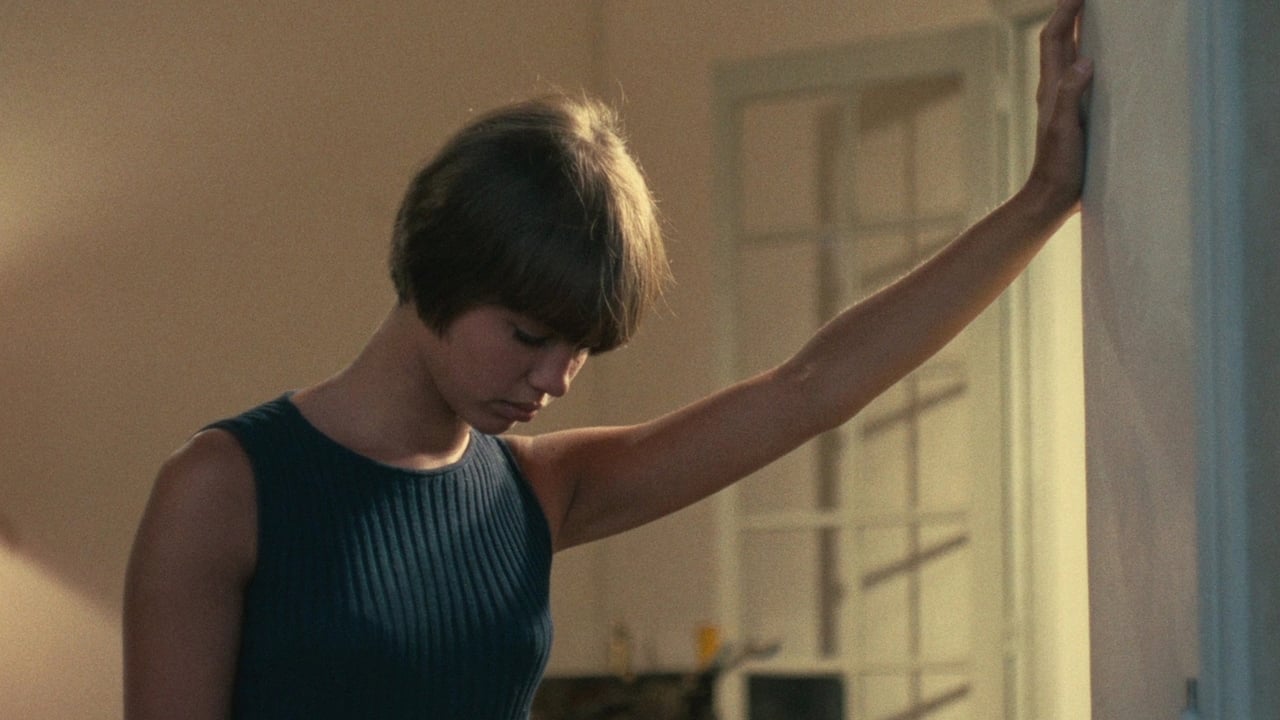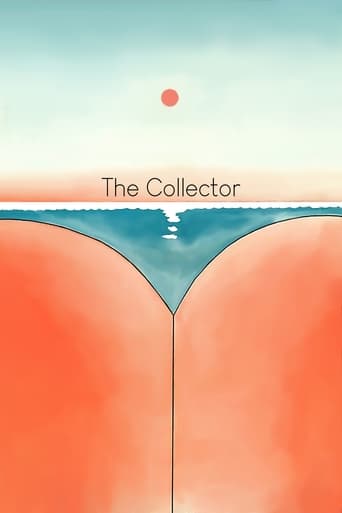Comwayon
A Disappointing Continuation
Sharkflei
Your blood may run cold, but you now find yourself pinioned to the story.
Abegail Noëlle
While it is a pity that the story wasn't told with more visual finesse, this is trivial compared to our real-world problems. It takes a good movie to put that into perspective.
Brooklynn
There's a more than satisfactory amount of boom-boom in the movie's trim running time.
nachtturne
A fine piece of the French art cinema, La collectionneuse tells a story of three individuals (Adrien, Haydee and Daniel) locked together in their common friends weekend house at the French Riviera. While Adriens and Daniels purpose is simply but strictly doing the capital Nothing, Haydee lives quite a bohemian life, going out and changing partners every night. At first, the boys don't care about Haydee, except finding her an annoyance, but shortly they include her in their inner circle. Soon the drama begins: Haydee tries her best to seduce Adrien, who is knowingly resisting her, fearing that she just want to add him to her collection of trophies, which would be shameful. At the same time however, Adrien lusts after the girl. A set of mind games unfold, with the two people pushing and pulling eachother, waiting for their prey to show its weak spot, so they can emerge victoriously in the end.The movie was very entertaining; I'm not sure if I ever saw such honest sexual chemistry on screen before. And not just that: all the characters work very well with eachother in every sequence. The actors are great, the writing is smart and sharp (with a deal of great one-liners), although sometimes the plot felt a bit dragged. The camera work is incredibly well done, especially for a '60s movie. Despite the tense nature of the main subject (how a relationship forms between two people), the movie feels very light - I guess it has to do with the characters "I dont give a damn"-mentality, which was well shown through their actions. The reason I'm giving 8 stars: while the movie was very entertaining, I don't feel like it had any real impact on me. I don't believe it should have, though.Overall, La Collectionneuse is an excellent movie to watch with that Art Student girl you've been chatting with on Tinder for three days now.
framptonhollis
This is the fourth film in Eric Rohmer's "Six Moral Tales" film series, and, since I'm watching the six films in order, the fourth film in the "Six Moral Tales" series that I've seen, as well as the second best (after the excellent "My Night at Maud's"). However, as much as I love this film, a majority of the it's characters are absolutely horrible people! But, I feel like this was intentional with at least a couple of these characters. For example. the character of Daniel is so utterly annoying and pathetic that I cannot help but believe that he is the type of character that was designed for the audience to hate. There's one scene towards the end in which the main character (named Adrien) introduces Daniel to another character, and Daniel just insults him and his profession.As unlikable as the characters may be, the film they're in is wonderful. It's entertaining, witty, well written, and beautifully made. The cinematography is absolutely lovely! This was Rohmer's first color film, and it works wonderfully with color."La collectionneuse" is a genius work of art
nycritic
LA COLECTIONNEUSE is Eric Rohmer's first color feature, and along with cinematographer and frequent collaborator Nestor Almendros, he uses a bright palette to maximum advantage in a story that like its time frame, is bursting in warm, vibrant hues that pretty much parallels the equally lightweight plot. Straying habitually close to the same story that makes up what the "Moral Tales" are about, this one concerns a frisky female, Haydee (Haydee Politoff), who captures the attention and equal repulsion of two other young men: Daniel (Daniel Pommereulle), an artist with a penchant for making art that literally cuts its viewers "who aren't sharp", and Adrien (Patrick Bauchau), a young art dealer who is soon to make a lucrative purchase from an American artist.Haydee is first seen in a frank, objectified way: walking on the beach of Saint Tropez, alone, as the camera lingers on her face (reminiscent of Charlize Theron), her torso, her legs. It's, in a way, Rohmer's mode of possibly depersonalizing his heroine since she remains a murky character with little definition -- one moment submissive, another moment quite take-charge, but always obscure. It's also a way of introducing her carefree way to the viewer; had she been introduced as a buttoned-down, prim female, it would have been clear her role would be that of a woman of stiff mores. But, as we see throughout the movie, Haydee is living in the middle of the swinging Sixties and she could care less about those things. Nor if her partying disturbs the sleep of Adrien or Daniel.Their share at the summer house in Saint Tropez is anything but placid. The two men are appalled at her behavior and decide not to have sex with Haydee "for her own good." Adrien even decides to dub her "The Collector" -- a moniker that makes up the title of the movie and points at a spiteful machismo because where men can be womanizers and be called studs, women who take on this attitude are sanctioned. He stays at a distance from Haydee as she becomes involved with Daniel. Their liaison, however, becomes rocky and both soon part ways, leaving Haydee and Adrien with an open door to come one step closer. In a shocking move, Adrien offers her to a prospective client in order to secure a Song vase. Surprisingly, she accepts, not without an incident involving the aforementioned vase, which in turn leads Haydee right into Adrien's arms.Rohmer's movie is not without its "Rohmerisms" where characters introduce themselves with lengthy discussions as to the nature of life, love, attractions, and repulsions. In fact, every character minus Haydee does so, which makes her the more elusive and difficult to describe. Is she just floating along with what the men think they want? Or is she really clueless, a woman who has a simple view on life and who doesn't find any guilt in her actions? Interestingly enough, her "philosophy" is rather close to that of Adrien's girlfriend (every male character in his "Six Moral Tales" arc has a steady) who sees love as universal, indifferent to beauty or ugliness. That Haydee acts upon Adrien's girlfriend's statement says a lot more about who the girlfriend might be, but sheds an accessible light on Haydee.And anyways, she comes off better than any of the two men, as do the other females of Rohmer's sextet -- Maud, Laura, or Chloe. (It's also interesting that all of the "other women" are mainly brunette and aggressive or assertive in temper, whereas the "ideal" one is frequently blond or passive in character.) Even when objectified, there is a mysterious likability within her that is missing in his two male leads. Adrien is a little hypocritical of his own observant nature and while he openly derides Haydee he also wants her. Daniel is a dark guy in this story and in all of the "Six Moral Tales" collection, not just because of his pain-inducing art, but a veneer of violence just underneath his arrogant demeanor. Maybe, in this story -- as well as all of his others -- Rohmer seems to be the Ultimate Observer, painting a picture in regards to immature men, their attraction to a worldly female, and their decision to remain in a complacent union with another one that can only be there as a Barbie doll.
taylor9885
This is such a flimsy story, as slight as Le Genou de Claire but not as well acted. Patrick Bauchau has a splendid profile, Haydee Politoff's mouth is adorable and Daniel Pommereulle knows how to tense his lips for dramatic effect but the story is dead in the water.A typical Rohmer protagonist is on holiday or somehow separated from his partner, and we are shown how he copes with temptation (Trintignant does so, splendidly, in Ma Nuit chez Maud). Who cares what happens to Bauchau's marriage here, when the actions of the characters are so uninvolving?

